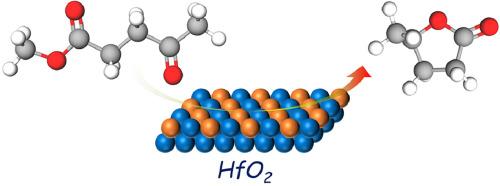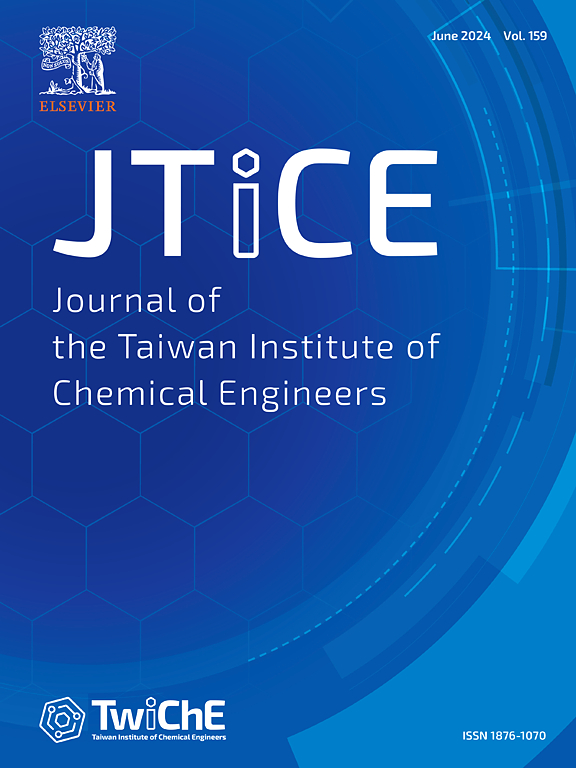Impact of hafnium dioxide morphology on catalytic transfer hydrogenation of methyl levulinate to γ-valerolactone: A comparative study
IF 5.5
3区 工程技术
Q1 ENGINEERING, CHEMICAL
Journal of the Taiwan Institute of Chemical Engineers
Pub Date : 2024-10-16
DOI:10.1016/j.jtice.2024.105801
引用次数: 0
Abstract
Background
The catalytic transfer hydrogenation (CTH) of methyl levulinate (ML) to γ-valerolactone (GVL) is a promising method for producing renewable fuels and chemicals. The efficiency of this process depends heavily on the choice of catalysts, with morphology playing a critical role in their performance.
Methods
This study synthesized and characterized rice-like (r-HfO₂) and ball-like (b-HfO₂) hafnium oxide nanostructures. r-HfO₂ was prepared using a microwave system, while b-HfO₂ was synthesized via a solvothermal method. The catalysts were characterized using SEM, TEM, XRD, TPD-NH₃ analysis, and nitrogen sorption isotherms to determine their morphological, structural, and acidic properties. The catalytic performance of these nanostructures was tested under optimal conditions of 160 °C and 2 h in a batch-type solvothermal reactor.
Significant Findings
The results showed that b-HfO₂ exhibited a conversion efficiency of 90 % and a GVL yield of 90 %, outperforming r-HfO₂, which achieved 94.8 % conversion and 75.2 % yield. Recyclability tests confirmed the durability of both catalysts, with b-HfO₂ maintaining better activity. Detailed analyses revealed that b-HfO₂ exhibits superior catalytic activity and energy efficiency, achieving higher GVL yield and better energy efficiency. The conversion rates reached up to 100 % for both catalysts at 200 °C, with b-HfO₂ achieving a higher GVL yield and better energy efficiency. These findings demonstrate the potential of HfO₂-based catalysts, especially b-HfO₂, in efficiently converting biomass-derived feedstocks to valuable chemicals.

二氧化铪形态对乙酰丙酸甲酯催化转移加氢生成γ-戊内酯的影响:比较研究
背景将乙酰丙酸甲酯(ML)催化转移加氢(CTH)为γ-戊内酯(GVL)是一种生产可再生燃料和化学品的可行方法。本研究合成并表征了米状(r-HfO₂)和球状(b-HfO₂)氧化铪纳米结构。r-HfO₂是用微波系统制备的,而 b-HfO₂ 是通过溶热法合成的。使用 SEM、TEM、XRD、TPD-NH₃ 分析和氮吸附等温线对催化剂进行了表征,以确定其形态、结构和酸性。结果表明,b-HfO₂ 的转化效率为 90%,GVL 收率为 90%,优于 r-HfO₂,后者的转化效率为 94.8%,收率为 75.2%。可回收性测试证实了这两种催化剂的耐久性,其中 b-HfO₂ 的活性更好。详细分析显示,b-HfO₂ 具有更高的催化活性和能效,可获得更高的 GVL 收率和更好的能效。两种催化剂在 200 °C 时的转化率均达到 100%,其中 b-HfO₂ 的 GVL 产率更高,能效更好。这些发现证明了基于 HfO₂的催化剂(尤其是 b-HfO₂)在将生物质原料高效转化为有价值化学品方面的潜力。
本文章由计算机程序翻译,如有差异,请以英文原文为准。
求助全文
约1分钟内获得全文
求助全文
来源期刊
CiteScore
9.10
自引率
14.00%
发文量
362
审稿时长
35 days
期刊介绍:
Journal of the Taiwan Institute of Chemical Engineers (formerly known as Journal of the Chinese Institute of Chemical Engineers) publishes original works, from fundamental principles to practical applications, in the broad field of chemical engineering with special focus on three aspects: Chemical and Biomolecular Science and Technology, Energy and Environmental Science and Technology, and Materials Science and Technology. Authors should choose for their manuscript an appropriate aspect section and a few related classifications when submitting to the journal online.

 求助内容:
求助内容: 应助结果提醒方式:
应助结果提醒方式:


